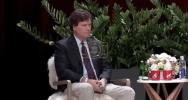נאך א מעגען קעלי דעבאטע רעדט טאקער קארלסאן פון פרי ספיטש


Tucker Carlson pushed back forcefully against Megyn Kelly during a live appearance in White Plains, New York, after she criticized him for interviewing controversial commentator Nick Fuentes without confrontation. The exchange quickly went viral, highlighting Carlson’s long-held defense of open dialogue and resistance to media groupthink.
During the November 6 broadcast, Kelly pressed Carlson over what she called a “soft” approach to Fuentes, who has been labeled a white nationalist by multiple outlets. Carlson, visibly unfazed, shot back: “Do your own interview. You’re not my editor, buzz off. You wanna yell at Fuentes, I’ll give you my cell. Call him.”
The crowd reacted audibly as Carlson reiterated his position that journalism should not be about moral posturing, but understanding perspectives — even those the public finds objectionable. “If you want to understand what’s happening in the world, you talk to people, not just the ones you agree with,” he said, adding that his willingness to host figures like Vladimir Putin or Nick Fuentes reflects his commitment to inquiry, not endorsement.
Carlson’s philosophy has long stood in contrast to mainstream networks that often refuse to platform controversial guests unless to confront or condemn them. He argues that such “performative opposition” is more about virtue-signaling than journalism. “My job isn’t to yell,” he has said in past interviews. “It’s to listen — because that’s how you learn what people actually believe.”
Supporters praised Carlson for defending open discourse, calling the exchange a prime example of why he remains one of the few independent voices unafraid of public pressure. Critics, however, accused him of normalizing extremist views by not pushing back harder during interviews.
The incident underscores an ongoing divide in American media — between those who view exposure to controversial viewpoints as dangerous, and those who see it as essential to understanding political and cultural realities. Carlson’s unapologetic stance once again reinforces where he stands: firmly on the side of unfiltered conversation, regardless of who takes offense.
גאלערי
ווידעאס